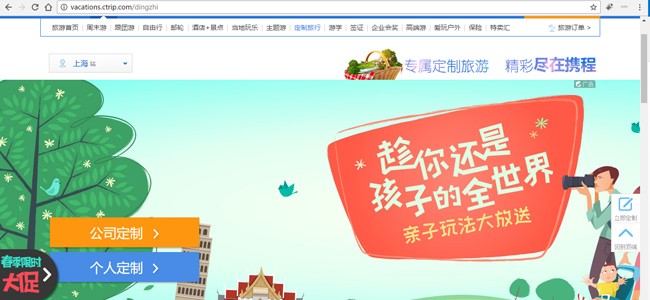China Spotlights
Customization and Co-Creation: Chinese consumers are prosumers as well
12.04.2017
In early 2014, a comedy film opened in Chinese movie theaters which became a huge success all over the country and brought in a total of 700 million Renminbi (almost 100 million Euros): “Personal Tailor”. The film was not only a box office hit, but also left its mark on local advertising campaigns and consumer expectations.

The story is short: The film is about a team of four very special characters who fulfill the dreams of three ordinary people. The team consists of a “Dream Planner”, a “Scenario Developer”, a “Dream Creator” and a “Soul Anesthetist”. Their job is to bring to reality their clients’ wildest dreams. For example, a cleaning woman is dreaming of a life in abundance. The fulfillment of her dream takes three steps: The first one consists in dressing her in glamorous clothes, making her up and dressing her hair. Then she receives coaching about how a rich woman feels and behaves. Finally, she may spend a night having an exquisite dinner at a VIP nightclub.
Although this story seems silly and not very spectacular at first glance, the movie was enormously influential. It triggered a wave of “Personal Tailor” campaigns in the Chinese business world. It was especially service providers such as travel agencies, cell-phone providers or gyms that presented themselves as “Personal Tailors’ to their customers. Ctrip, one of the leading travel operators, suddenly offered “Tailor-Made Traveling’ for private persons and companies on their website. Entering information about the desired trip (destinations, time, desired services, number of travelers…) in the online form, the customer receives a tailor-made itinerary.

Another example is the premium smartphone provider 8848 Titanium Mobile who launched a limited edition of phones in 2016 which the consumers could customize themselves (materials, colors etc.). The smartphone arrived at the consumer’s home two weeks after the individual customization. Through the film mentioned above, the previously unknown term of the “Personal Tailor” made its entry into the Chinese language and established the equally unknown concept of the tailor-made solution in the Chinese consumers’ minds. In the meantime, many Chinese consumers have enthusiastically embraced the idea that manufacturers and service providers offer tailor-made dream solutions catering to individual needs.
The new Chinese consumer: more demanding and more individual
So, what’s the bigger picture in which this story must be set? Chinese consumers have become more mature and demanding, have increased their spending power and have gotten more individual. Gone are the days when consumption decisions were not about the consumers’ own desires and needs, but about investing the scarce money without running risks that is, in the tried-and-tested products bought by the “broad masses”. Many consumers still think like that, which becomes evident in the great importance of word-of-mouth and brand awareness in China. But the number of those who have greater expectations regarding products and services due to their increasing purchasing power and consumption competence is growing rapidly. They dare take individual consumption decisions and deal with products and services more critically. They are not satisfied anymore with mass products meeting the taste and needs of millions of Chinese.
I would even dare say that Chinese consumers are turning more and more into prosumers. They take individual product choices and find it more and more attractive to participate in the design of these products.
Chinese industry: on the fast track towards the world of prosumption
The Chinese industry is reacting to this development and does so a lot faster than one might expect. More and more leading business managers are stating that the increasing need for tailor-made products and services will sooner or later result in a revolution of the Chinese economic model: getting away from B2B/B2C towards C2B, meaning Consumer-to-Business. The CEO of China’s biggest online shopping platform “Alibaba”, Jack Ma, affirmed the following: “We will see a shift to C2B. In other words, it’s all about customization […], it’s not about cost competition any longer, we have to compete against value.” What Ma wants to say is that in the future, customers will mold business according to their needs. Alibaba’s plan is to adjust to this situation, driving retail giant Walmart from position one of global sales rankings. He can definitely be sure of getting full support from the Chinese government, as it has declared the promotion of the C2B business one of their goals for the Chinese industry. Accordingly, Prime Minister Li Keqiang stated at a session of the State Council on January 27, 2016: “The C2B business requires a stronger involvement of the consumers. Companies should design their products according to the consumers’ needs. Manufacturers are not isolated anymore, but must be in close connection with the market, for example via internet. The future exchange between manufacturers and customers must be very close.”
Haier, the biggest Chinese manufacturer of domestic appliances, was already a pioneer of this new business model in 2012, launching an interesting co-creation campaign. On Alibaba’s e-commerce platform, Haier let consumers create television sets and actually put the results on sale. More than one million participants designed their ideal television sets from options in six different categories (size, frame design and color, image resolution, energy consumption, technical connections) and selected the best ones in a vote. 5,000 pieces each of the three winning designs were produced within eight days and were sold out within four hours. Meanwhile, Haier has founded a separate company specialized in the production of customer-specific and tailor-made household appliances.

What’s next: Where must this new customer orientation lead the business world?
In order to be prepared for the new C2B business, companies must adjust to the diversification of customer needs in two ways. On the one hand, they must upgrade their production lines, for example with flexible robots. On the other hand, they must also create possibilities to learn from the consumers about their individual needs and desires in a prompt and concrete manner. This requires new communication channels, but Big Data and algorithms will also become more and more important here. What is happening in China in this field will be the topic of one of the next posts. In a country with nearly 1.4 billion inhabitants, Big Data is obviously a special challenge, but interesting solutions are out there already.


